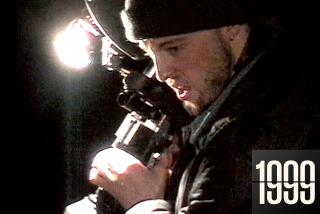Mogul hopes he’s built a Krakow-adjacent Hollywood
About 20 miles outside of Krakow, amid fields that unfold endlessly beyond Poland’s second-largest city, a “Blade Runner”-like complex looms: Fourteen silvery domes, their interiors tricked out like the chambers of a spaceship, connected to one another via glass tunnel.
Inside the complex, past a guard booth shaped like a giant helmet, doors open with a whoosh when fingerprint scanners detect an approved visitor. In one cavernous space, banks of rooms with showers and beds are stacked several stories high, as though providing quarters for Captain Jean-Luc Picard and his crew. A Space Age cafeteria bears a strong resemblance to the “Stars Wars” cantina.
If it sounds like the set of a science fiction film, well, it could be. But the man behind the whimsical facility, called Alvernia Studios, hopes it’s something more than that — an unlikely new player in film production and financing. The facility’s mastermind is an eccentric, press-averse mogul named Stanislaw Tyczynski, who made his money founding Poland’s first commercial radio station, RMF FM. He sold it five years ago to the German conglomerate Bauer for several hundred million dollars, using the cash to establish Alvernia, which he hopes will put Poland on the movie map.
Unlike most efforts in other Eastern European cities such as Prague or Budapest, where the focus has been on funding from the government or from U.S. interests, Tyczynski is trying a different tack: a privately financed, wholly local entity. His campus here is a reminder that even some of the most un-Hollywood-like corners of the world want, realistically or not, to be a part of the filmmaking game.
“We hope to be everything in the movie business,” said Robert Kalinowski, Tyczynski’s chief publicist, aide-de-camp and face to the outside world. “With money and good ideas, we can be, no?” he said, sounding at once boastful and needy.
‘Money,’ ‘blockbusters’
Tyczynski, 53, created Alvernia Studios in 2010 to fund English-language, star-centric films and serve as a facility where those films can be shot and edited. (There is a staff of executives and crew of about 70 that can swell depending on the number of films in production.)
The company has put money into “Vamps,” a recently shot vampire romantic comedy directed by “Clueless” director Amy Heckerling and starring Sigourney Weaver and Alicia Silverstone; it was edited at Alvernia earlier this year and is seeking a U.S. distribution deal. Tyczynski’s firm also recently agreed to co-finance Nicholas Jarecki’s $10-million financial-world thriller “Arbitrage,” starring Richard Gere and Tim Roth, which recently finished shooting and will go into postproduction at Alvernia in the fall. A smattering of Polish productions are also using the facility.
Underlying the company’s mission is a kind of disdain for government regulation and funding that would make Michele Bachmann proud. Asked via email about what has surprised him most about the film business — as leery of the press as he is of government, Tyczynski rarely gives interviews and, according to Kalinowski, has never answered questions from a U.S. media outlet until now — Tyczynski replied:
“European socialism! And more specifically, European scale of insanity in financing films by European taxpayers. Yes, it is 500 million of Europeans that are financing movie crap, even without going to the movies!” he said, alluding to state-run film commissions in many European countries.
Even with Tyczynski’s deep pockets, though, top-flight directors are difficult to attract to a place like suburban Krakow. Alvernia is an unknown entity, and most filmmakers would rather not risk meddling from a Polish mogul. Others with dreams like Tyczynski’s have tried and failed — the list of international companies with big Hollywood dreams that belly-flopped is long, stretching from the Middle East to Western Europe.
Yet Tyczynski believes that a shift is inevitable: American filmmakers need money more urgently than ever, and entrepreneurs like him want to bring both business and prestige to their home country. A company like Alvernia, he says, helps everybody win.
Krakow has a rich cinematic history. The city of 750,000 is the birthplace of Roman Polanski, and directors such as Jerzy Skolimoswki have shot and set movies throughout Poland. But Alvernia doesn’t want to make the kind of small films those auteurs are interested in. Asked at the Cannes Film Festival this spring about Alvernia’s philosophy, Lukasz Poninski, the company’s international sales agent, had a succinct answer: “Money. A lot of money. With big blockbusters. These small Polish films are too dark and depressing.”
Rafa? Orlicki, the head of the Krakow Film Commission, which is tasked with luring productions to the city, thinks Alvernia represents a renaissance for Poland and a new model for the global film business. “These guys are helping a lot,” he said over dinner in Krakow. “There’s never been anything like it in Poland or really anywhere in Eastern Europe.”
Alvernia claims to be the first non-government-run movie studio built in Poland since World War II. That’s likely true, though given how much was run by the state under Communism, that may not be saying much. (Western Europe has a number of sprawling, if not quite as “Jetsons”-like, facilities, such as Studio Babelsberg in Germany and Pinewood Studios in the United Kingdom.)
“More and more producers are like gypsies, going where the money is, and if I have to be stuck somewhere for five weeks without my family, Alvernia and Krakow are nice places to be,” said Lauren Versel, producer of “Vamps.” “It’s a lot better than being in Detroit,” she added, referring to the Michigan city’s emergence as a production hub thanks to a sprawling new facility and generous tax incentives.
Alvernia offers some advantages over its Western European and American counterparts. Producers can pay in zloty, one of the few remaining European currencies that makes the dollar look strong. (The country is a member of the European Union but wouldn’t join the Eurozone until 2015 at the earliest and has no immediate plans to adopt the euro currency.)
As Poninski also helpfully points out, cost-conscious Western filmmakers “wouldn’t have to worry about unions or anything like that,” a somewhat odd comment given the country’s late-20th-century history with workers’ revolutions. And Krakow, largely unscathed during World War II, is a picturesque place with numerous dining and sightseeing options.
Still, there are also plenty of obstacles. Competent English speakers are far scarcer than in much of Western Europe, and the distances can be daunting. Krakow is nearly 1,000 miles east of Paris, and there are no direct flights from the United States, making a brochure’s proud claim of proximity — “Alvernia is situated under the space domes, halfway from Krakow to Katowice by the A4 motorway, between the Balice and Pyrzowice airports” — a little amusing.
Taking a tour
On a Sunday afternoon this spring, Alvernia was quiet — no movie was in postproduction and the weather was warm, prompting many Poles to take off for restaurants or resort towns. The calm made the studio seem even more Space Age and surreal.
Narrating a tour of the facility, Kalinowski, 42, exuded a coiled energy and a manner somewhere between that of a politician and a used-car salesman. A slight man with a thin layer of facial scruff, Kalinowski, who once worked as a radio reporter for Tyczynski, peppers his speech with seemingly candid asides — about the company, recent film releases, his country — though never seems to lose track of his pitch or the company’s mission.
Kalinowski’s main task is to represent Tyczynski. The mogul is an almost mythic figure in Poland who in many ways epitomizes Eastern Europe’s evolution into capitalism. He came to prominence as a Socialist revolutionary — he was a part of the country’s Solidarity movement in the 1980s and founded a workers-centric radio station — then became an entrepreneur, launching RMF, the country’s first commercial radio group, when Poland developed a market economy in the 1990s.
But after clashing with government regulators one too many times, Tyczynski sold RMF and started the film studio. He designed the entire complex himself, right down to the upholstery on the chairs in the cafeteria. He was inspired, he says, by the work of Swiss surrealist H.R. Giger.
Tyczynski says he got into the movie business because of the medium’s reach. “Radio, even if it operates on the national scale, will always be local. Cinema is global. Besides, can there be any more revolution on air? The technology can be developed, but the formula is exhausted,” he said. His interest in cinema also hits a little closer to home — his wife, Renata Gabryjelska, is a well-known actress in Poland.
Tyczynski is hardly the delegating sort. He has been known to get into the nitty-gritty, reading scripts and offering notes in the way that may be beneath even a mid-level Hollywood executive. (Versel, the producer, calls him “hands-on but a visionary.”) Depending on one’s point of view, he’s imperious or a maverick.
He’s also prone to flights of fancy; asked if he’s concerned that some American producers may view Poland as too far from Hollywood, he replied: “Of course, Poland is too far from Hollywood, but the other way round it seems to be closer. Have you noticed? However if you wanted to ask: ‘whether, by any chance, Alvernia Studios intend[s] to attack Hollywood with the Polish national-liberation-Catholic patois film,’ then I hasten to report that you can sleep peacefully.”
In perhaps an unconscious throwback to the Communist era, Kalinowski and other Alvernia employees refer to Tyczynski as “our president,” as if he runs the government instead of a company that facilitates the production of vampire comedies. But Kalinowski says the title is deserved; Tyczynski, he says, is “thinking big.” Of course, thinking big can mean something different in Eastern Europe than in Hollywood. When asked to offer a potential project, Kalinowski suggests a musical based on a famous Polish poem, then realizes he hasn’t thought internationally enough. “No, no,” he said, correcting himself. “We want to make big movies. Like ‘Black Swan.’ Big, commercial movies.”
As he guides a reporter into the blazing sunshine, via a door that looks like a giant alien mouth, Kalinowski takes a break from talking about his family to flog Alvernia. “This place is fun, and it has great facilities,” he said, gesturing to the grandiosity behind him. “And there’s money. Doesn’t every filmmaker around the world want money?”
More to Read
The biggest entertainment stories
Get our big stories about Hollywood, film, television, music, arts, culture and more right in your inbox as soon as they publish.
You may occasionally receive promotional content from the Los Angeles Times.











